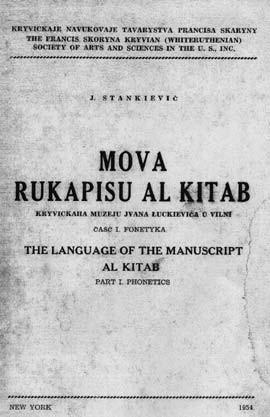This is a Belarusian written in Arabic letters (arabitsa) used by the Lipka Tatars, who had been invited to settle in Belarusian territory, at the time part of the Grand Duchy of Lithuania. Books of that tradition are known locally as Kitab ("Кітаб") which is Arabic for a book.
Kitabs were written mostly in the 16th century by the Tatars that lived in Belarus, the Grand Duchy of Lithuania, since 14-15th centuries and have gradually forgotten their native language.
Kitabs contain legends, adventure stories, rituals, narratives for youth about moral and ethical behavior. Apart from kitabs there also other related books as tefsirs, tejvijs, and hamails with line-by-line commentary in Belarusian and Polish.
Starting from the 14th century Tatars started moving into Belarus, some as prisoners of war, others voluntarily. For a certain period of time they had preserved their own tradition, but gradually have been joining the Belarusian cultural context.
By 16-17th centuries the great majority of Lipka Tatars already forgot the Tatar language. Risale-i-tatar-i leh, a report from a Tatar traveler made for the Suleiman I, tells that the Tatar language was used only by the Tatars who moved to the Grand Duchy.
The studies of Kitabs begin in the 19th century as their discovery is attributed to Mukhlinsky, a professor at Petersburg University. They came into light again in the beginning of the 20th century.
Nowadays Kitabs are being preserved in the libraries of the Academy of Science of Belarus, Academy of Science of Lithuania, Vilnius University, Petersburg and Kazan University, Vilnius History, and Ethnography Museum.
The migration of Tatars into Lithuania and Poland from Golden Horde began during the 14th century and lasted until the end of the 17th. By 1590–1591 there were about 200,000 Lipka Tatars living in the Rzeczpospolita and about 400 mosques serving them.
The largest communities existed in the cities of Lida, Navahrudak, and Iwye. There was a Lipka Tatar settlement in Vilnius, known as Totorių Lukiškės, Tatar quarter in Trakai and in Minsk, known as Tatarskaya Slabada.
Beginning in the late 18th and throughout the 19th century, the Lipkas became successively more polonized. The upper and middle classes in particular adopted the Polish language although they kept Islam as their religion, while the lower ranks became Ruthenized.
At the same time, the Tatars held the Lithuanian Grand Duke Vytautas, who encouraged and supported their settlement in the late 14th and early 15th century, in great esteem, including him in many legends, prayers, and their folklore.

 Read on Twitter
Read on Twitter



